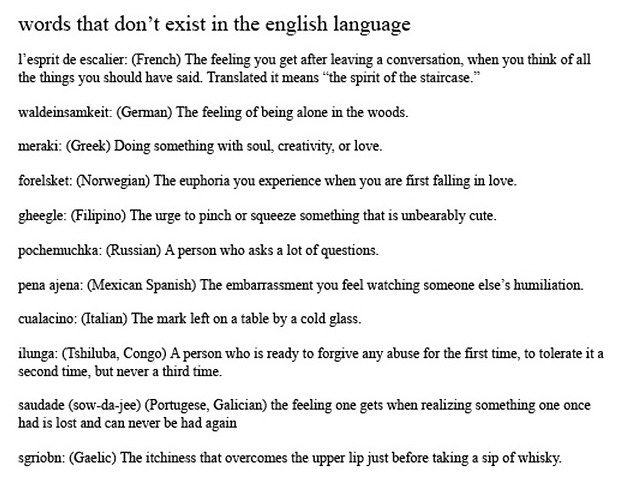Follow Blame it on the Voices on Twitter | Blame it on the Voices on Facebook
 If you liked this post, you can
subscribe to the Blame It On The Voices RSS feed and get your regular fix
If you liked this post, you can
subscribe to the Blame It On The Voices RSS feed and get your regular fix
 If you liked this post, you can
subscribe to the Blame It On The Voices RSS feed and get your regular fix
If you liked this post, you can
subscribe to the Blame It On The Voices RSS feed and get your regular fix
Subscribe to:
Post Comments (Atom)










20 comentarii:
l'esprit d'escalier in German: Treppenwitz
pena ajena: fremdschämen
:D
Dude, I'm German and I have never heard of "Waldeinsamkeit".
The word you are looking for is "mutterseelenallein" and describes the feeling of beeing forever alone.
Mutter=mother Seele=soul allein=alone
Now that's cool.
My favorite is:
もっこり (mokkori) (Japanese): "tent" an erection makes against pants or bedsheets
I'm french and I've never heard about the "Esprit d'escalier" expression. mmh mmh!
ok ok...it's a joke: I'm italian and we have a lot of weird stuff but...nobody says 'cualacino'
Considering the Portuguese (I don't know Galician), I think the translation of 'saudade' is imprecise. The thing (or person, whatever) once lost isn't necessarily irretrievable.
It's so stupid to say that "mexican spanish", that expression is SPANISH from Spain (Traditional sort), do you think Spanish is only Mexico?
Me da verguenza ajena que digan pena ajena.
Dear fellow Germans, 'Waldeinsamkeit' is an actual German term. However, it is really oldfashioned language. You can check, it has been used by several poets of the romatic movement (19th century). People who actually went in the woods to be alone (probably, for a lack of other amusements, lol).
Es verdad, es VERGÜENZA AJENA.. no pena ajenga.
en el norte de mexico si se dice pena ajena!
as said before, "saudade", it's not only for when someone is lost forever, it's closest translation to english would be "to miss". And it can be used when we are talking about a person, a place, anything. By representing such a great feeling for us(brazilians), strange is the fact that others languages dont have a similar word (:
"saudade" in Galician can be almost directly translated into "morriña", which broadly means nostalgia
Waldeinsamkeit might be a old term but basicly you can merge all german words together like that.
Wald = Forest/Woods
Einsamkeit = Lonelyness
Plane -> Flugzeug
+ Einsamkeit= Flugzeugeinsamkeit (The feeling of beeing alone in a Plane)
Schadenfreude is a much more interresting word merge.
Schaden = Damage
Freude = Joy (Like in Ode an die Freude/Ode to Joy)
Well, stuff like this makes german such a hard language to learn.
BTW:
Zeitgeist: Spirit/Ghost of time
Poltergeist: Rumble Ghost
Bratwurst: Fried Sausage
Sauerkreat: Sour Herb
Kitsch: Well no translation here :)
40 % of the Norwegian language derives directly from german. (Lended words from the Hanseatic period) we also have the expression "skadefryd" - joy you feel when your enemy is in pain. (Schadenfreude in German)
As for the word "forelsket", from this post it means "in love". English uses the word more widely, you love your girl/boy friend, but you also love your family and friends. But in a different way. You definately don't want to be "forelsket" in your brother or a sister. So, i guess this definition for Norwegian is correct... however, the english language is not in lack of a similar expression - to be "in love" means exactly the same as "forelsket".
So, post fail...
In italian language the word 'cualacino' doesn't exist, the correct word is 'culaccino' but no one used it.
I'm Norwegian, and i remember finding it strange to find only one word for the different levels of love. I feel that "to be in love" does not properly describe the meaning of "forelsket". The English word "infatuated" is much closer.
Cualacino is what? I'm Italian and I assure you that I never heard of that word once in my life, until I browsed a tumbler and found this statement...It sounds to me more like an italian dialect word.
Alessandra
The correct spelling of the world in Italian is "Culaccino" and not "Cualacino". Cualacino doesn't mean shit